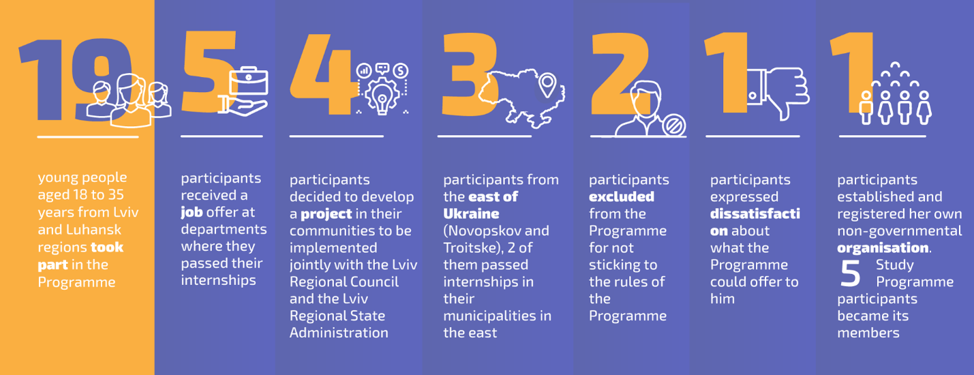Over the summer of 2019, 19 people between the ages of 18 and 35 from the Lviv and Luhansk regions got to work with local governments as part of the “Strengthening Youth Engagement in Local Governance” programme. Participants took part in a four-month internship in the Lviv Regional Council and the Regional State Administration, attended five training sessions, took part in public discussions in Kyiv and Lviv and carried a study tour to one of the amalgamated communities of Ukraine.
DRI experts and partners from the Centre for Perspective Initiatives and Studies advised and guided the participants throughout the internship.
Programme Overview

In addition to the four-month internship, participants engaged in five training sessions of 2 to3 days each, which were held in Lviv and Kyiv. The training sessions were an attempt to initiate discussions on pressing issues in different areas of public administration and to find a way to solve them efficiently.
DRI experts explored important topics related to the activities of government agencies, public policy, key soft and hard skills to be efficient agents of change. We discussed Ukraine’s political system, the competences of local governments, the development and management of public budgets, and how to improve interactions between regions. Participants also learned how to work with open data on the ProZorro public procurement system. In addition, we talked about the decentralization of power and its components.
Much time was devoted to understanding the intricate details of the EU-Ukraine Association Agreement, beyond the ideological decision to focus on European integration. Participants talked with leading experts about the essence of these reforms, the state and the prospects of their implementation.
Every speaker emphasized the difficulties and the amount of time that will be needed to implement these reforms.
The trainers also noted that civil servants should not underestimate the importance of communication, both internally and externally. Without an effective communication strategy, coherence is difficult within a unit and makes communicating with the public that much harder. The effectiveness, perception and success of changes directly depend on the involvement of the general public and people’s awareness of specific topics.
Challenging Negative Perceptions
The first step to motivate young people to engage with local government is to challenge the many stereotypes that stick to Ukraine’s public sector. It did not take long for our participants to challenge and change their views of local government.
Stanislav Letsyk, who interned at Lviv Regional State Administration’s Department of Internal and Information Policy, challenged his view of the civil services: “What I liked the most was that I could see the results of my work and measure in practice the experience I gained. The internship was very useful for me as I received a lot of new knowledge and defied my stereotypes towards civil service. As for the people in the department, they encouraged me to work and develop myself. There is a widespread opinion in the society that the civil service is difficult for young people to join or there is nothing for them there. I proved myself wrong.”
What participants took away from the programme
We asked participants about their impressions from their internships in government agencies and for their advice to those who hesitate about getting involved in public service. The experience was much richer than they had initially thought it would be.
Oleksandr Husliakov, who interned at Lviv Regional Council’s International Department shared his thoughts on the programme: “Now I sometimes laugh when I hear that everything is outdated in the public administration and that their employees accept nothing nor anybody new. For example, in my department, almost all employees are young people. All of them know at least English, and some speak German or Polish as well. Communication between employees is at a high level, we use messengers to communicate quickly with each other. It is very pleasant that there is absolutely nothing Soviet in the department – neither in the relations between employees nor in the working practices.”
“I was involved in tasks that can be only be performed by those with the relevant background or experience – for instance, I distributed Treasury Account Statements. Of course, to do this, I was supposed to know the Budget Code of Ukraine very well. Sometimes it was necessary to work on making some information public. For example, to take care that the department’s website always contains data on budget implementation,” added Andrianna Bilash, who interned at Lviv Regional State Administration’s Department of Finance.
Daily work would also involve much more than making copies or fetching coffee. “I was given very diverse tasks. For example, to find development programmes for entrepreneurs offered by banks in the Lviv region,” said Sviatoslav Moskaliuk, who interned at Lviv Regional State Administration’s Department of Economic Policy. “To do this, I had to analyse programmes for entrepreneurs from all the banks registered in the region and make it all into one database. I also spent a lot of time looking for companies that are not quite transparent with paying wages to their employees.”
The skills they applied ranged from analysis to communications. This was the case for Nadia Bavoliak, who interned at Lviv Regional Council’s Department for Computer-based Information Support and Access to Public Information. “I was entrusted with the ‘Lviv Region Tourism’ project. My department prepared the material for the website with the same name: we looked for content, reviewed the state of historical monuments and the potential of touristic attractions, designed the website, etc. It was a very interesting, useful and cognitive task. I also had to work a bit with legislation to write a feasibility study for various projects.”
Encouraging others to follow in their footsteps
Participating in the programme direct results many of the young people involved. Five participants were offered jobs in the departments where they interned, while four launched their own local initiatives that will be implemented in cooperation with the local council.
They also had recommendations for other young people who are interested in changing Ukraine for the better. “I sincerely wish that future civil servants realise that this work is a very good opportunity to help others and the country, the opportunity to realise that you are doing something really important. Whatever the situation, we should not forget our humanity, should not behave as if we were superior to others. This feeling of superiority is what everyone in this country should try to get rid of today,” said Nadia Bavoliak.
This was echoed by Uliana Yazhyk: “If you are young, active, open and ready to change, then you should definitely try yourself in the role of a civil servant. Over time, you will understand that you can influence and change things. First at the local level, and then nationally. However, we must always remember that changes start within you and your thinking.”
Meet the participants



